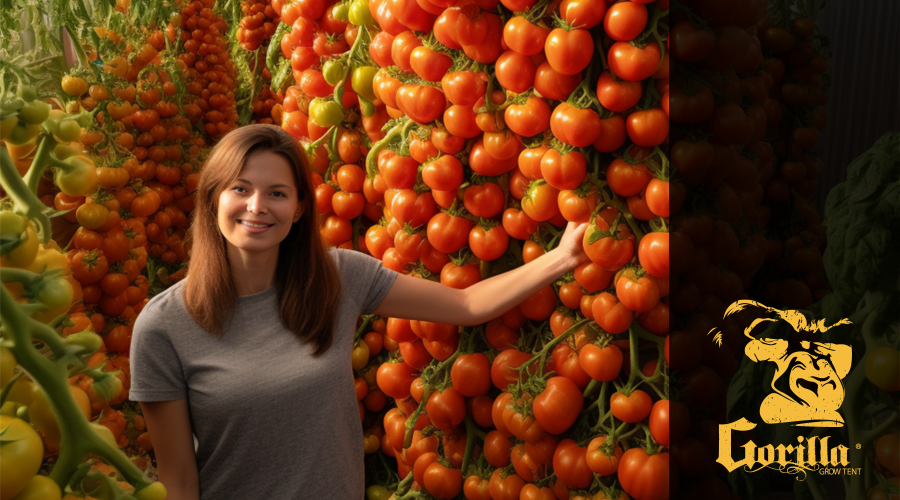
How to Make Tomato Plants Grow Faster
A Comprehensive Guide to Nurturing Abundant Tomato Harvests
Tomatoes are a popular garden vegetable, and for good reason. They are relatively easy to grow, and they produce an abundance of delicious fruit. However, if you want to get the most out of your tomato plants, you need to know how to make them grow faster.
To maximize your tomato harvest and enjoy an abundance of delicious tomatoes, consider these effective strategies:

Choose a fast-maturing variety
There are many different varieties of tomatoes available, and some of them mature much faster than others. If you want to get an early harvest, choose a fast-maturing variety. Some popular fast-maturing varieties include:
Cherry tomatoes
Grape tomatoes
Early Girl tomatoes
Sunrise tomatoes
Start your plants from seeds
Starting your plants from seeds is a great way to save money, and it also gives you more control over the variety of tomatoes you grow. However, it does take a bit more time and effort than buying plants from a nursery.
If you're starting your plants from seeds, you'll need to start them indoors for about 6-8 weeks before you want to transplant them outdoors. You can start them in seed trays or individual pots.
Warm up the soil
Tomatoes are warm-weather plants, so they need warm soil to grow properly. If your soil is too cold, your plants will not grow as quickly. You can warm up your soil by adding compost or other organic matter or by covering it with black plastic mulch.
Harden off your plants
Before you transplant your tomato plants outdoors, you need to harden them off. This means gradually exposing them to outdoor conditions over a period of a week or two. This will help them to acclimate to the change in temperature and light and will reduce the risk of transplant shock.
Protect your plants from wind and chill
Tomato plants are sensitive to wind and chill. If you live in an area with strong winds, you may need to protect your plants with a windbreak. You can also protect your plants from frost by covering them with a sheet or blanket.
Wait to apply mulch
Mulch can help to conserve moisture and suppress weeds, but it can also keep the soil too cool for tomato plants. Wait until the soil has warmed up before applying mulch.
Provide support for your plants
As your tomato plants grow, they will need support. You can use stakes, cages, or trellises to support your plants. This will help them to grow tall and strong and will prevent them from breaking or falling over.
Water your plants regularly
Tomato plants need water to grow, but they don't like to have wet feet. Water your plants deeply and infrequently, and make sure the water drains away from the base of the plants.
Fertilize your plants regularly
Tomato plants are heavy feeders, so they need to be fertilized regularly. Use a balanced fertilizer that is specifically designed for tomatoes.
Remove suckers
Suckers are small shoots that grow at the junction of the main stem and a branch. Suckers can take energy away from the plant and reduce the yield. Remove suckers as soon as you see them.
Prune your plants
Pruning your tomato plants can help to improve air circulation and reduce the risk of disease. Prune away any dead, diseased, or damaged leaves. You can also prune away some of the healthy leaves to encourage the plant to put its energy into producing fruit.
Monitor your plants for pests and diseases
There are a number of pests and diseases that can attack tomato plants. Be sure to monitor your plants regularly and take action if you see any signs of trouble.
Essential Nutrients for Thriving Tomato Plants
Tomato plants are beloved by gardeners for their juicy, flavorful fruits. But to ensure a bountiful harvest, it's crucial to provide your tomato plants with the essential nutrients they need to thrive.
Nitrogen
Nitrogen is a key element for healthy tomato plant growth, particularly during the early stages of development. It promotes vigorous vegetative growth, resulting in lush green foliage. A deficiency in nitrogen can lead to stunted growth, pale leaves, and poor fruit production.
Phosphorus
Phosphorus plays a vital role in root development, flower formation, and fruit ripening. It helps the plant efficiently utilize energy and transport nutrients throughout its system. A lack of phosphorus can result in weak roots, delayed flowering, and poor fruit quality.
Potassium
Potassium is essential for overall plant health and disease resistance. It helps regulate water balance, strengthen cell walls, and promote fruit set. A deficiency in potassium can lead to weak stems, wilting leaves, and reduced fruit quality.
Calcium
Calcium is crucial for cell wall formation and fruit development. It helps prevent blossom end rot, a common disease that causes tomatoes to develop sunken, discolored spots at the blossom end. A deficiency in calcium can also lead to weak stems and poor fruit quality.
Magnesium
Magnesium is essential for photosynthesis, the process by which plants convert sunlight into energy. It also helps activate enzymes involved in various plant functions. A deficiency in magnesium can lead to yellowing leaves, stunted growth, and poor fruit quality.
Sulfur
Sulfur is a component of amino acids, the building blocks of proteins. It also helps protect plants from diseases. A deficiency in sulfur can lead to stunted growth and yellowing leaves.
Iron
Iron is essential for chlorophyll production, the pigment that gives plants their green color. It also helps transport oxygen throughout the plant. A deficiency in iron can lead to yellowing leaves, stunted growth, and poor fruit quality.
Boron
Boron is crucial for cell wall formation, pollen tube development, and fruit set. A deficiency in boron can lead to weak stems, poor fruit quality, and reduced fertility.
Zinc
Zinc is essential for enzyme activation and plant hormone production. It also helps protect plants from diseases. A deficiency in zinc can lead to stunted growth, yellowing leaves, and poor fruit quality.
Copper
Copper is essential for enzyme activation and plant growth. It also helps protect plants from diseases. A deficiency in copper can lead to stunted growth, yellowing leaves, and poor fruit quality.
Molybdenum
Molybdenum is essential for nitrogen fixation, a process by which plants convert nitrogen from the air into a form they can use. A deficiency in molybdenum can lead to yellowing leaves and stunted growth.
Grow Your Own Tomatoes Year-Round with a Grow Tent
Growing tomatoes outdoors can be challenging, especially if you live in an area with a short growing season or unpredictable weather.
This is where grow tents come in. A grow tent is a self-contained indoor growing environment that allows you to control the light, temperature, and humidity. This makes it possible to grow tomatoes year-round, regardless of the outdoor conditions.
Benefits of Growing Tomatoes in a Grow Tent
There are many benefits to growing tomatoes in a grow tent. Some of the most notable benefits include:
Year-round growing: Grow tents allow you to grow tomatoes year-round, regardless of the outdoor conditions.
Control over environment: You can control the light, temperature, and humidity in your grow tent, which gives you more control over the growth of your plants.
Reduced pest and disease problems: Grow tents help to protect your plants from pests and diseases.
Improved yield: Grow tents can help to improve the yield of your tomato plants.
Choosing a Grow Tent for Tomatoes
When choosing a grow tent for tomatoes, you need to consider the size of your plants, the number of plants you want to grow, and the amount of space you have available. A good rule of thumb is to choose a tent that is at least 3 feet tall and 4 feet wide for every 2-3 plants.
You will also need to purchase a grow light and ventilation system for your grow tent. The type of grow light you need will depend on the variety of tomatoes you are growing. For most tomatoes, a full-spectrum LED grow light is the best choice.
With proper care and attention, your tomato plants will reward you with an abundant harvest of delicious, homegrown tomatoes. Enjoy the fruits of your labor and share them with friends and family.


